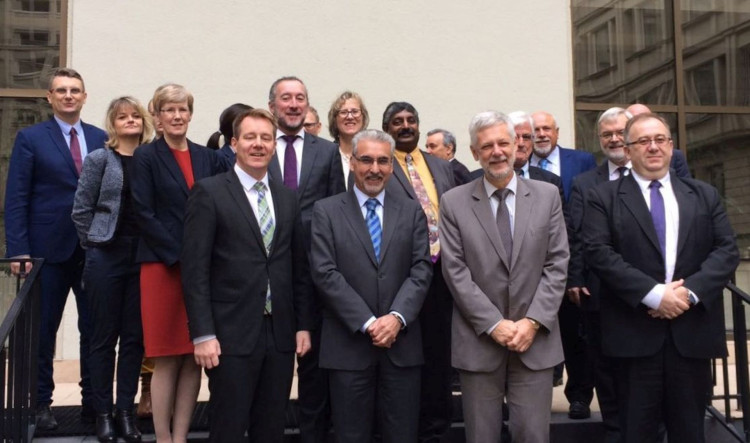An International Atomic Energy Agency (IAEA) team of experts said Poland is committed to the safe management of radioactive waste and spent fuel and also noted areas for potential improvement ahead of its planned introduction of a nuclear power programme.
The Integrated Review Service for Radioactive Waste and Spent Fuel Management, Decommissioning and Remediation (ARTEMIS) team concluded a 10-day mission to Poland on 10 October. The mission, requested by the Government of Poland, was hosted by the Ministry of Energy, with the participation of state waste management organization ZUOP and the National Atomic Energy Agency (PAA), which is responsible for nuclear and radiation safety regulation in the country.
ARTEMIS missions provide independent expert advice from an international team of specialists convened by the IAEA. Reviews are based on the IAEA safety standards and technical guidance as well as international good practices. The mission to Poland was the first requested by a European Union Member State with the aim of meeting EU obligations that require an independent review of national programmes for the management of radioactive waste and spent fuel.
Poland operates the MARIA research reactor and is decommissioning the EWA research reactor, both located at the Swierk site near the central town of Otwock. Since the early 1960s Poland has operated the National Radioactive Waste Repository in the town of Różan. The Government is also in the process of revising plans approved in 2014 to develop a nuclear power programme over the coming decades.
The ARTEMIS team said Poland has established a good basis for the safe and responsible management of radioactive waste and spent fuel. The team highlighted the strong commitment of all interested parties for the implementation of this programme, particularly in view of the planned nuclear power programme.
“Poland has most of the elements in place for the national programme for managing radioactive waste and spent fuel, in particular for safe predisposal management,” said ARTEMIS team leader Jussi Heinonen, Director of Nuclear Waste and Material Regulation at STUK, the Finnish nuclear regulator. “Our review highlights Poland’s strengths as well as the areas where room for improvement has been identified.”
The team commended the Government for the development and maintenance of a national inventory of radioactive waste, and noted that operations for the predisposal management of radioactive waste have been successfully carried out for decades. The team said that Poland is well aware of the steps needed to ensure the development and implementation of a national plan for the safe management of radioactive waste and spent fuel.
Recommendations and suggestions provided by the team included:
- The Government should ensure that Research & Development is undertaken to support implementation of the national plan for waste management, establishing priorities with clear timeframes and resources for its timely execution.
- ZUOP should prepare an up-to-date safety case for the Różan Facility, including a safety assessment and Waste Acceptance Criteria, and submit these to the regulator for review.
- The Government should consider providing measurable indicators with clearly identified timeframes, so that progress in the implementation of the national plan can be monitored effectively.
The team comprised five experts from Belgium, Finland, France, South Africa and the United Kingdom as well as three IAEA staff members. The team held meetings with officials from the Ministry of Energy, ZUOP, and PAA at the Ministry of Energy in Warsaw and visited the waste treatment and storage facilities at Swierk.
Poland has plans to construct and operate by 2025 a near-surface disposal facility for low and intermediate-level radioactive waste. “A decade is enough time to establish such a facility, but several steps, including public support and regulations, still need to be taken,” said Józef Sobolewski, Director of the Nuclear Energy Department at the Ministry of Energy.
“This peer review was conducted by a team with a wide range of knowledge and expertise,” said Andrzej Piotrowski, Undersecretary of State at the Ministry of Energy. “The outcome of the mission was positive while also providing us with findings that will be a good basis for future improvements.”
IAEA Deputy Director General Juan Carlos Lentijo, Head of the IAEA’s Department of Nuclear Safety and Security, said the Polish counterparts were well prepared for and transparent in their discussions. “This mission provides feedback that will help further improve the development and implementation of Poland’s radioactive waste-management programme and reach an even higher standard of safety,” he said.
The final mission report will be provided to the Government in about two months.
About ARTEMIS
ARTEMIS is an integrated expert review service for radioactive waste and spent fuel management, decommissioning and remediation programmes. This service is intended for facility operators and organizations responsible for radioactive waste management, as well as for regulators, national policy makers and other decision makers.


